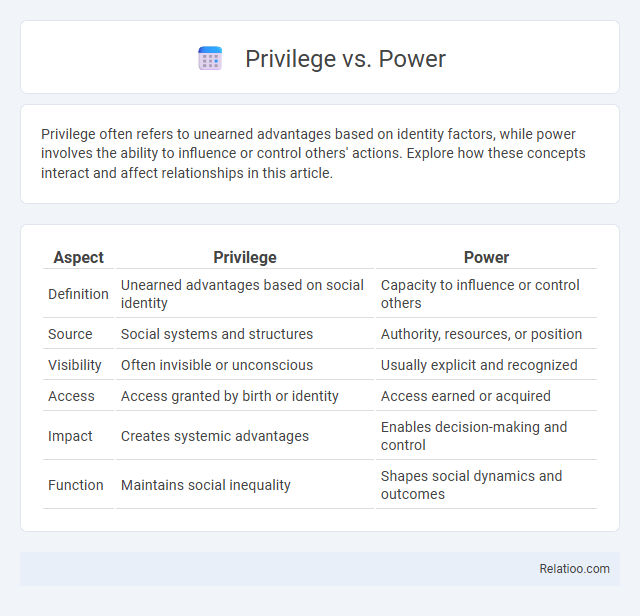Privilege often refers to unearned advantages based on identity factors, while power involves the ability to influence or control others' actions. Explore how these concepts interact and affect relationships in this article.
Table of Comparison
| Aspect | Privilege | Power |
|---|---|---|
| Definition | Unearned advantages based on social identity | Capacity to influence or control others |
| Source | Social systems and structures | Authority, resources, or position |
| Visibility | Often invisible or unconscious | Usually explicit and recognized |
| Access | Access granted by birth or identity | Access earned or acquired |
| Impact | Creates systemic advantages | Enables decision-making and control |
| Function | Maintains social inequality | Shapes social dynamics and outcomes |
Defining Privilege: What Does It Really Mean?
Privilege refers to unearned advantages or rights granted to individuals based on social categories such as race, gender, socioeconomic status, or ability. It represents systemic benefits that confer ease, access, and opportunities to certain groups while marginalizing others. Understanding privilege requires recognizing its embedded nature in societal structures and how it perpetuates inequality regardless of personal intentions.
Understanding Power: Influence and Control
Understanding power involves recognizing its dual components: influence and control, where influence shapes decisions and opinions while control enforces compliance and directs resources. Power manifests in various forms such as political, economic, and social, each affecting your ability to drive change and maintain authority. Mastering this distinction enhances your effectiveness in leadership and advocacy by balancing persuasive impact with strategic control.
Privilege and Power: Key Differences Explained
Privilege refers to the unearned advantages individuals or groups have based on social identities such as race, gender, or class, while power is the ability to influence or control others' behavior and resources. Your awareness of privilege highlights systemic inequalities rooted in societal structures, whereas power often involves active decision-making and authority within those systems. Understanding these distinctions helps clarify how societal dynamics operate and affect opportunities and outcomes differently for various groups.
The Intersection of Privilege and Power
Privilege and power intersect as privilege often provides unearned advantages that enhance an individual's capacity to exert power within social, economic, and political contexts. The accumulation of privilege--such as race, gender, or socioeconomic status--amplifies power by creating systemic opportunities and access to resources that others lack. This intersection reinforces structural inequalities, perpetuating dominance and limiting social mobility for marginalized groups.
Historical Context: Privilege and Power Through Time
Historical context reveals that privilege and power have often been intertwined, shaping social hierarchies and access to resources across civilizations. Power usually refers to the ability to enforce decisions and control others, while privilege denotes unearned advantages tied to identity factors such as race, gender, or class. Understanding your position within these dynamics helps recognize how historical systems perpetuate disparities and influence contemporary social structures.
Privilege in Social Structures and Institutions
Privilege in social structures and institutions manifests as unearned advantages embedded within systems like education, law enforcement, and employment, often favoring dominant groups based on race, gender, or socioeconomic status. These systemic privileges create disparities by granting preferential access to resources, opportunities, and rights, reinforcing social hierarchies and limiting social mobility for marginalized communities. Understanding privilege requires analyzing how institutional policies and cultural norms perpetuate inequality, maintaining power imbalances across society.
Power Dynamics in Daily Life
Power dynamics in daily life shape relationships and social structures, influencing how privilege manifests and is exercised. Your ability to navigate these dynamics depends on recognizing the interplay between personal power, social privilege, and systemic power imbalances. Understanding this complex relationship helps address inequality and fosters more equitable interactions.
The Impact of Privilege on Access and Opportunity
Privilege significantly shapes access and opportunity by granting certain groups easier entry to resources and advantages based on inherent or social characteristics such as race, gender, or socioeconomic status. Power influences how those with privilege can enforce and maintain systemic barriers, further perpetuating inequality. Your ability to navigate and challenge these dynamics depends on recognizing how privilege interplays with power to create disparities in opportunity.
Challenging Systems of Privilege and Power
Challenging systems of privilege and power requires understanding how entrenched social hierarchies perpetuate inequality through institutionalized advantages and control mechanisms. You must critically analyze policies, cultural norms, and economic structures that sustain privilege while amplifying certain groups' power at the expense of marginalized communities. Effective resistance involves disrupting these systemic patterns by promoting equity, representation, and accountability within organizations and society.
Moving Forward: Allyship, Equity, and Change
Privilege, power, and oppression intersect uniquely in social dynamics, influencing how individuals experience access and barriers. Advancing allyship involves recognizing these differences, actively listening to marginalized voices, and leveraging privilege to disrupt systemic inequities. Fostering equity demands intentional actions that redistribute power, promote inclusive policies, and sustain transformative change within communities and institutions.

Infographic: Privilege vs Power
 relatioo.com
relatioo.com